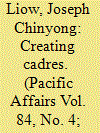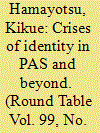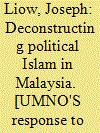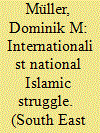| Srl | Item |
| 1 |
ID:
108796


|
|
|
|
|
| Publication |
2011.
|
| Summary/Abstract |
Since the 1999 general elections, when it emerged with the most impressing performance in Malaysian political history, the Pan-Malaysian Islamic Party, or PAS, has elicited significant scholarly attention. This has resulted in the production of a wealth of information about the party's origins and evolution. Yet, while most observers of Malaysian politics note that, next to UMNO, PAS is the most organized and well-resourced political party in the country, there remains a dearth of knowledge about the internal workings of PAS, and specifically, how the party developed, maintained and mobilizes its impressive machinery. This paper aims to unpack the puzzle of the nature of PAS's mobilization by studying the party's youth wing (also known as PAS Youth). Through the conceptual framework of resource mobilization theory and a detailed study of milestone events in the party's recent history, the paper argues that the youth wing has played a pivotal role in defining the party's identity as well as its political triumphs. At the same time, however, its integral role within PAS has meant that the challenges confronting the parent party have undoubtedly rebounded upon them as well.
|
|
|
|
|
|
|
|
|
|
|
|
|
|
|
|
| 2 |
ID:
094947


|
|
|
|
|
| Publication |
2010.
|
| Summary/Abstract |
Controversies and frictions related to Islam since the political ascendancy of the opposition coalition, Pakatan Rakyat, after the 8 March 2008 general elections have revealed multiple crises of identity not only in PAS (Islamic Party of Malaysia) and Pakatan Rakyat, but also in broader Malaysian society. It is argued that the pattern of frictions within PAS and Pakatan Rakyat has to do with the diminishing place of Muslim-Malay identity and interests in the avowedly multi-ethnic Pakatan Rakyat regime. It is suggested that these frictions are largely attributed to the distinctive character and emphasis of the Islamisation enterprises sponsored by the ruling regime under the United Malays National Organisation since the 1980s and growing Muslim anxiety and frustration about their position within the Malaysian polity.
|
|
|
|
|
|
|
|
|
|
|
|
|
|
|
|
| 3 |
ID:
047363


|
|
|
|
|
| Publication |
Singapore, Institute of Defence and Strategic Studies, 2003.
|
| Description |
25p.
|
| Contents |
IDSS Working Paper No. 45
|
|
|
|
|
|
|
|
|
|
|
|
Copies: C:1/I:0,R:0,Q:0
Circulation
| Accession# | Call# | Current Location | Status | Policy | Location |
| 046652 | 297.27209595/LIO 046652 | Main | On Shelf | General | |
|
|
|
|
| 4 |
ID:
101351


|
|
|
|
|
| Publication |
2010.
|
| Summary/Abstract |
Localized constructions of transnational Islamic kinship or 'brothers abroad' are an integral part of discursive practices within the community of the Islamic Party of Malaysia (PAS). Based on empirical data gained from anthropological fieldwork between 2009 and 2010, this article examines domestic manifestations and the implicit subtexts of the party's foreign policy, with particular regard to the Palestinian cause. Narratives of victimization and heroism are thereby as important as demonizing projections of delinquency and evil, while at times images of local and external enemies melt together. Furthermore, it is shown that PAS's Islamist internationalism is essentially (g)local, whereas national and ummahist identities are referred to only selectively.
|
|
|
|
|
|
|
|
|
|
|
|
|
|
|
|
| 5 |
ID:
101347


|
|
|
|
|
| Publication |
2010.
|
| Summary/Abstract |
This article examines the extent to which the Malaysian Islamic Party (PAS) and the Prosperous Justice Party (PKS) are becoming more moderate in their strategy and ideology. The author contends that both parties are struggling over the extent to which they should moderate in response both to strategic incentives present in the Malaysian and Indonesian political systems and to the political learning process whereby both parties are coming to understand the preferences of voters in their respective political systems. This process is complicated by divisions in the parties between pragmatists who would postpone controversial goals to reach out to non-devout voters, and purists who prioritize ideological authenticity.
|
|
|
|
|
|
|
|
|
|
|
|
|
|
|
|